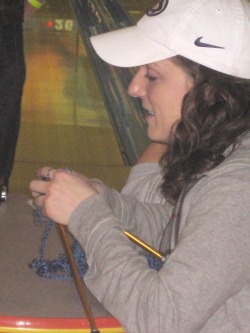Sarah O'Donald

Learning to knit was not an easy task for me and I was definitely frustrated and confused by the concept when I first heard of it in my Women’s Studies class. My frustration and confusion grew more from the disappearance of conformity in the classroom than from the task itself. Never before had I been in a class where we had a choice throughout as to the direction of the curriculum. [We] created a classroom in which feminism allowed discussion, and knitting provided us with a medium for stimulating vigorous conversations and creative thought.
The class further developed into a discussion of using the act of knitting as a form of peaceful protest. We observed an organization of American artists called, “Knitta Please” who use their knitting purely as a disruption of public space by tagging or leaving their knitted objects in public spaces. This group takes the private, socialized, and gendered task of knitting and allows it to have a voice outside of the home. Our goal as a class was to also give our knitting this voice.
We decided to take our knitting outside of the classroom, removing it from the private sphere and into the public. We knitted while riding public transportation and throughout campus. We tagged trees on campus with our work and held a Knit-in for Darfur in which we peacefully protested the genocide and provided a way for others to gain awareness of Darfur and to donate to refugees. Knitting became a tool for us to reach out to the public in our community in a way that has never been done before. Using knitting to protest is unheard of in this college town. In turn our protests may be quiet but we are seemingly heard often. I decided to take this concept of peaceful and artistic protest and continue it through a university club. We have decided to dedicate ourselves to the defense of human rights because we gained from our feminist pedagogy a sense of community, unity; and knitting for peace gave us a great way to take what we learned in the classroom and move it into the public eye.
We wanted to create a means of activism on our campus that could achieve similar goals of other groups but in a very unique way. Our hope was to inspire our generation and lift their spirits to a form of activism that welcomes them to join. We created a club in which the club itself has a voice in what decisions are made for events and activities. We took these ideals from our learned feminist pedagogy in the classroom and attempted to create this similar shared and communal effort in the public eye for humanitarian efforts. Knitting is not just a relaxing and peaceful act. Knitting is voices speaking out against the many injustices to human kind around the world to create a better sense of global community through a peaceful shared act.
